Congratulations to the Risk Prize finalists
The Cambridge Centre for Risk Studies, in conjunction with McKinsey & Company, is pleased to announce the winners of the Cambridge – McKinsey Risk Prize. The prize recognises the best submission on risk management by a current student at Cambridge Judge Business School.
2024
First place
Emily Tianyuan Wang, 3rd-year PhD Candidate, Department of Land Economy, University of Cambridge
Honourable mentions
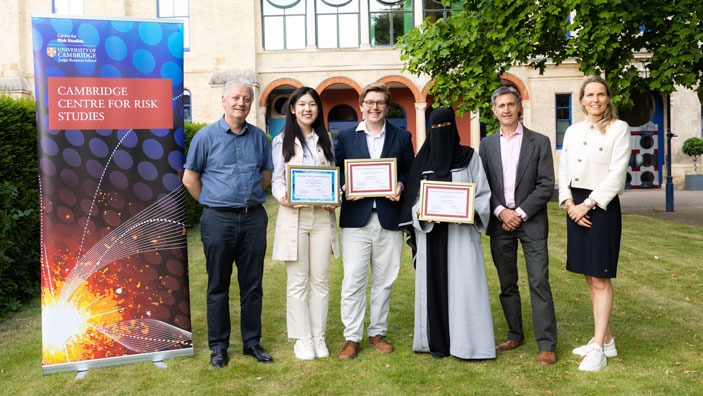
2023
First place
Sannah H.P. van Balen, PhD candidate, Nuclear Energy group, Department of Engineering, University of Cambridge
Honourable mentions
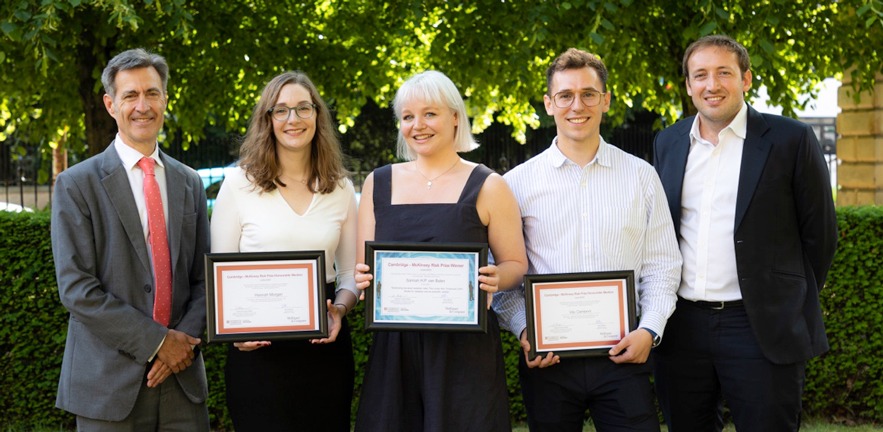
2022
First place
Rob Glew, PhD candidate, Manufacturing Engineering, University of Cambridge
The failure to effectively manage risks in development aid is a barrier to helping the fragile states that need it most. Failures, such the case study of Afghanistan in this essay, occur when risk management fails to achieve flexibility, transparency, and efficiency. In Afghanistan, perhaps 22 million people are at risk of falling into extreme suffering now that support for resilient farming, educational equality, and child malnutrition has been withdrawn after the rise of the insurgent Taliban government. This essay examines why leading development organisations failed to adapt their risk management approaches to this new context. Building on current best practice and taking a multi-disciplinary approach, the tools of systems engineering are applied to bureaucracy. The result is a new modular approach to risk management in development aid.
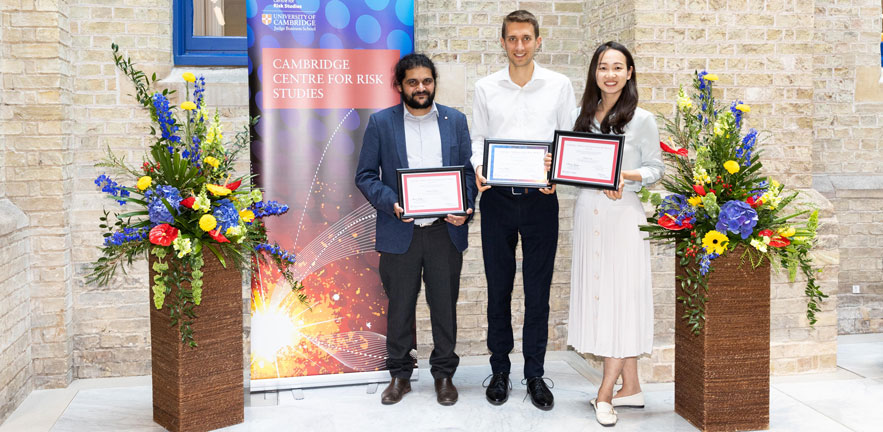
Honourable mentions
Huimin Bao Insurance is probably the group insurance product with the largest number of participants. This insurance product involves insurance companies, government, technology company and millions of residents, forming an ecosystem. As the actuary who designed and conducted pricing for Huimin Bao Insurance, I observed risks of this ecosystem from and formulated potential solutions to tackle the risks.
As we look back at the last decade and a half, humankind has experienced a financial crisis, a pandemic, inadequate responses to climate change, two situations that could have escalated into a war but didn’t, and one which did. We do live in the proverbial ‘interesting times’. It is up to us to try not to make it more ‘interesting’ by squabbling over international tax rights. It is in our interests to come up with a frictionless and speedy system of resolution of international tax disputes.
The current international tax dispute resolution mechanism known as Mutual Agreement Procedure (‘MAP’) is inherently inefficient in the sense that it does not always culminate into a resolution of disputes that is acceptable to the parties. This creates significant business risks to Multinational Entities (i.e., the taxpayers) because the taxpayers cannot be certain of the tax treatment of a particular aspect of their business model in a particular country. This paper proposes a solution for reducing the friction in the MAP process. The paper begins by describing the current MAP process, pointing out the issues, and the resultant bottlenecks. The paper then describes the risks to international commerce and proposes a measure to address those risks and make the process more efficient.
2021
First place
Sheryn Gillin, MSt in Construction Engineering candidate, University of Cambridge
Focussing on the theft of electronic health records and vulnerability of clinical devices overlooks the risks from the building services that maintain the environment within a healthcare facility.
Operating theatres, laboratories, pharmacies, sterile stores and imaging equipment have stringent humidity requirements to minimise the risk to patients. To achieve these optimal conditions, chilled water must function within set tolerances. Any divergence will significantly impact a hospital due to cancelled surgeries or diagnostic procedures, an MRI quench or disposal of sterile products.
To minimise the disruption a cyber-attack targeting the chilled water systems could cause, several recommendations, regarding contracts, procurement, design, assurance and documentation are proposed. Addressing these areas at the earliest opportunity is crucial because it is cheaper to design in, rather than bolt on a cybersecure architecture.
Honourable mentions
Value at Risk in private equity funds can be estimated using stochastic cash flow models, as first done by Buchner (2014). This paper uses additional model parameters to account for fees and return skews, following a stochastic model. Fees are given a similar structure to call options and are allowed to vary with portfolio performance. Return skews are generated through a Poisson jump parameter, which provides a nonstandard representation of fund dynamics. It shows that VaR approximately doubles when fees are introduced and dynamics change significantly when accounting for skews in private equity returns. This result was robust at all VaR confidence levels. In the latter sections, the paper presents additional calibration methods and potential improvements to the model.
We are at risk of not meeting our multi-lateral governance goals, eg The Paris Agreement, to abate climate change. While this question will require a multi-faceted response, the widespread adoption of a simple financial instrument may prove useful. It is clear that infrastructure needs to be improved. The standard avenue for funding these types of projects would include governments issuing debt in the form of treasury bonds. While green finance is a growing area with billions more being invested each year, Tate believes this idea is incomplete. At present, investors are often incentivised with tax credits to invest in green projects. Unless there is a mass creation of green bonds, we will not be able to meet our Sustainable Development Goals. Tate proposes a structured bond linked specifically to initiative targets, issued and backed by governments. They will lower risk to the investor and the country issuing them. These benefits to investors could galvanise the carbon credit market. They would also prove an easy to adopt tool for the governments of the world to achieve their SDGs.
2020
First place
Sam Vosper, PhD candidate, Department of Land Economy and Researcher, Cambridge Centre for Environment, Energy and Natural Resource Governance (C-EENRG)
This essay presents one of the first case studies to shed light on the significant impact that basis risk can have on the uptake of index insurances. Here Sam explored these dynamics of adoption for an active micro-insurance product at an unprecedentedly large scale. This case study considers a novel index insurance to manage agricultural crop losses which has seen near 200,000 adoptions by smallholder farmers across southern Kenya. The findings have important implications for tackling challenges of poverty and food security by also for the proliferation of index insurance to other development agendas, such as energy and health.This essay presents one of the first case studies to shed light on the significant impact that basis risk can have on the uptake of index insurances. Here Sam explored these dynamics of adoption for an active micro-insurance product at an unprecedentedly large scale. This case study considers a novel index insurance to manage agricultural crop losses which has seen near 200,000 adoptions by smallholder farmers across southern Kenya. The findings have important implications for tackling challenges of poverty and food security by also for the proliferation of index insurance to other development agendas, such as energy and health.
Honourable mentions
The urgent need for mitigating climate change, as set out in the Paris Agreement and the IPCC report is calling for a substantial reallocation of capital away from the fossil industry in order to achieve a transition towards a low-carbon economy. This transition is likely to entail significant risks for the financial system and the real economy. This essay aims at:
- investigating a specific type of such risk – the risk stemming from Stranded Fossil Fuel Assets (SFFA)
- deriving relevant risk-mitigating implications for the private sector and regulators.
Plastics represent a serious ESG challenge for beverage companies within the UK. Increasing headwinds from consumer awareness, coupled with government legislation imposing greater producer responsibility, will severely impact the economics of the beverage industry operating model. This paper describes and addresses the financial effects of four identified plastic risks; plastic permissibility, container deposit return schemes, plastic taxes and plastic bans. In a worst-case scenario, the cumulative impacts from these risks are modelled at a cost of £688 million per year by 2024. Several potential mitigation activities are discussed to counter the potential impacts of these risks.
2019
First place
Aly Verjee, MSt International Relations, Department of Politics and International Studies, University of Cambridge
A maxim in commercial aviation is that airlines almost always lose money. Some analysts go as far as to argue that the global industry has collectively never turned a profit. Whatever the accuracy of the overall accounting, it is clear that commercial aviation is an industry in which it is difficult to thrive. The industry’s history demonstrates that airline expansion risks, and often overextends, the fundamental strengths of the business. However, despite the many pitfalls, most airlines do explicitly seek to expand. Therefore, identifying – and then managing and mitigating – the risks of expansion is essential if a growth strategy is to succeed. This essay addresses the case of what was, for nearly sixty years, a small, mostly unremarkable, state-owned airline, in an aviation market more commonly associated with war and poverty, and its rise to become its continent’s largest and most profitable airline, and one of the most rapidly growing worldwide: Ethiopian Airlines (call sign: ET), founded in 1945.
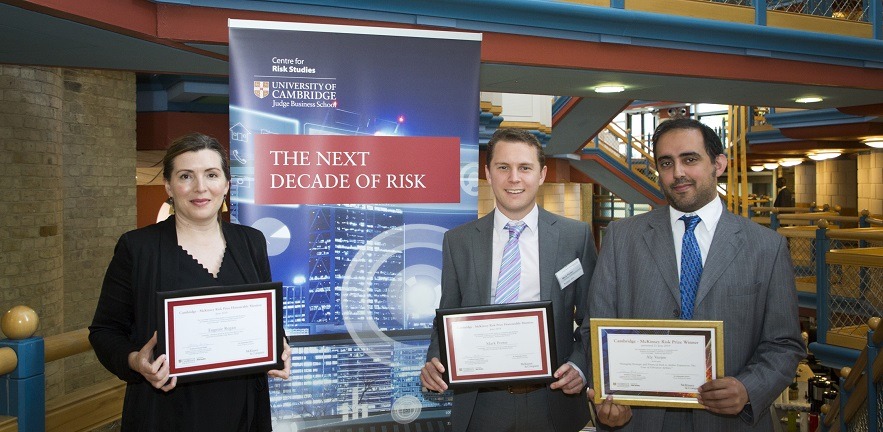
Honourable mentions
This report analyses the Madagascan vanilla cultivation industry from a risk perspective. It describes the environmental and economic setting of vanilla cultivation in Madagascar, before discussing its inclement risks. First, the external, macro-factors of natural hazard risk on Madagascan vanilla are examined and an assessment made as to whether, given a certain level of common knowledge surrounding these hazards, combined with challenges specific to vanilla agriculture, the decision by farmers to cultivate vanilla at the expense of other subsistence crops constitutes a measured choice or reckless act. The report then discusses how the ensuing price surge following cyclone Enawo created new risk factors in the form of poor-quality product and community violence, upending a simplistic model of commodities risk by placing both producers and their customers on the same side. Finally, the paper asks whether this alignment of risk provides a path forward, by providing incentives for both farmers and buyers to work together toward a more sustainable future.
Despite being a significant risk to businesses, biodiversity loss (and associated ecosystem collapse) is a risk that is extremely difficult to quantify and therefore address within business decision-making. This paper outlines the issue of biodiversity risks for businesses and make a number of recommendations for how biodiversity risks can be addressed and in some circumstances present how risks can present opportunities for businesses.
2018
First place
Ann Sofie Cloots, PhD candidate, Faculty of Law, University of Cambridge
This paper is about legal risks as well as a number of operational and systemic risks, associated with the acceptance and use of cryptocurrencies and the blockchain technology. The paper consists of five parts. After an introductory section one, section two analyses the main legal risks of cryptocurrencies, in particular the risk that tokens may be re-qualified retroactively as securities by regulatory agencies. Section three assesses the legal risks of blockchain, the technology underlying cryptocurrencies, in particular the compliance risks flowing from the much-discussed EU GDPR. Section four discusses operational and potential systemic risks of cryptocurrencies and blockchain technology. Section five concludes with practical takeaways for risk managers.
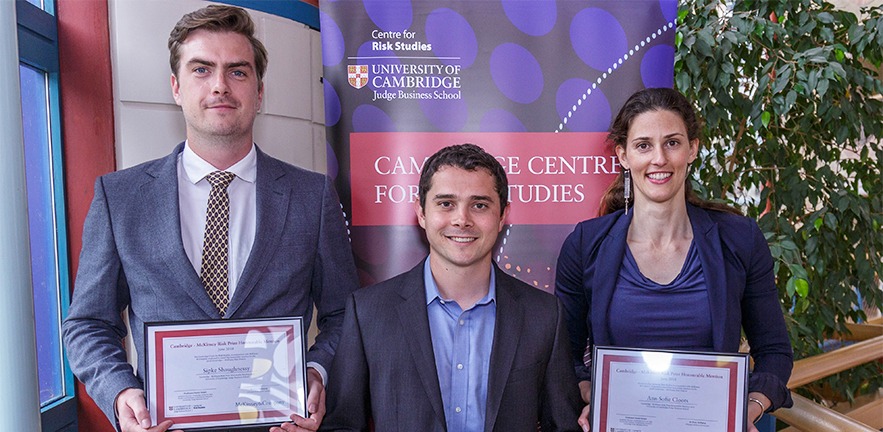
Honourable mentions
In a healthcare system notorious for inefficiency, US hospital organisations have long maintained a central role in care delivery. Predictions of disruption have swirled for years while the ebb and flow of healthcare reform proposals have become a steady feature of national conversation. Meanwhile, hospital leaders have grown accustomed to surviving in an increasingly competitive business with shrinking margins. Yet change is in the air. A convergence of trends in the healthcare economy may produce a shift where hospital organisations risk losing their dominant position in the business of delivering care. This paper explores these risks and how US hospital systems may be better compete in a shifting landscape.
Nomadic pastoralism brings with it a variety of risks. For instance, a heavy reliance on animal herding leaves pastoralists vulnerable to environmental shocks such as drought, or to having their assets wiped out by disease epizootics. The worsening effects of climate change and land privatisation (which limits nomadic mobility) have significantly exacerbated these risks. How, then, do pastoralists deal with them? This essay will explore three key strategies used by pastoralists to mitigate the risks they face while herding animals across the East African rangelands. These are social bonding, ‘commoning’ and diversification. The first two work by enabling ‘risk-pooling’, while the final strategy facilitates the ability to respond to market fluctuations and environmental shocks. This essay will explore each of these in turn before briefly assessing how the example of East African pastoralists could inform wider approaches to risk management. First, however, the paper will outline the way in which pastoralist capitalise on the inherent risk and uncertainty of living on the East African rangelands.
2017
First place
Steven Cooney, Executive MBA Candidate, Cambridge Judge Business School
The American coal power industry has been under siege from regulation, partially driven by concerns about climate change, and historically low natural gas prices, which is largely a result of the US shale revolution. This paper will utilise scenarios to evaluate how US railroads, who generate a significant proportion of their revenue from coal transportation, can best adapt to a changing energy generation and resource production market.
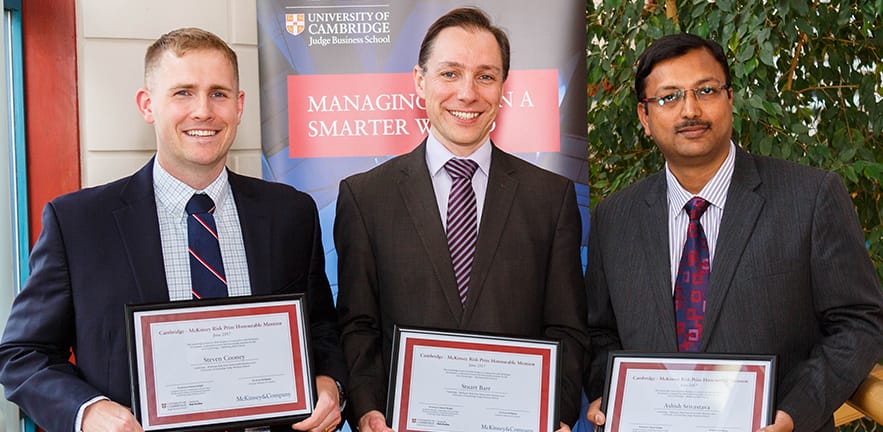
Honourable mentions
Academic literature treats risk almost exclusively as a negative concept: to be mitigated. This essay asserts that this one-sided orthodoxy leads to an incomplete understanding, and charts new territory by investigating its upside, using an ethnographic study of Dame Shirley Bassey performing live rather than miming at the 2013 Academy Awards.
Whilst producers like to minimise operational and reputational risk inherent in genuinely live performances, music artistes like the jeopardy of performing live because of the adrenaline-driven emotional enhancement and spontaneity it generates.
By examining the underlying reward factors that performing with jeopardy brings, the author proposes that the best possible outcome is only achieved when the risk-minimisation needs of producers are balanced with the jeopardy-maximisation needs of performers. A new bilateral framework is proposed that adds an upside dimension to conventional risk assessment.
There is a void of research into the upsides of risk, and this essay suggests that an enriched understanding of it could bring greater insight into fields as diverse as financial trading, extreme sports, the military and emergency medicine.
The likelihood of not getting the desired funding at an appropriate cost or the probability of bearing an undue loss of value in a fire sale is recognised as the liquidity risk. However, a flat idiosyncratic liquidity risk does not necessarily translate into a similar risk neutral position at the systemic level. Systemic liquidity risk emanates from the underestimation and imprecise understanding of the liquidity conundrum and its causal relationship with the exogenous or endogenous factors. Systemic risk finally devolves at the macro level with serious repercussions. This paper attempts a macroeconomic evaluation of the systemic liquidity risk from the perspective of developing economies. As a test case, the relevant macroeconomic data from the Indian financial system has been used for the purpose of analysis, modelling and interpretation.
2016
First place
Rasheed Saleuddin, PhD candidate, Department of History, University of Cambridge, PhD Scholar at the Cambridge Endowment for Research in Finance
The question of whether or not to mark to (the current observable) market (price) is an important one for risk takers and risk managers, and therefore company directors, creditors and shareholders. If extremes in ABX market prices can not be said to be fundamentally based (on reasonable expectations), marking to market may overstate risk and make institutional balance sheets appear overly fragile.
This paper first introduces and expands on a naïve backward looking model utilised by Stanton and Wallace to dismiss ABX price observations during the crisis as irrational. Saleuddin’s revised model is then used to explain the problems with Gorton and GM’s similar conclusions as to ABX irrationality. In the second part of his paper, Saleuddin then approximates contemporary expectations by extrapolating fundamental data using forward looking modelling (“roll rate analysis”) that was available and well accepted by contemporary investors. Only by modelling expectations extant at the time can we legitimately assess the degree of rationality in ABX prices, and to knowledge, this paper is the first to model expectations during the crisis using such historical methods.
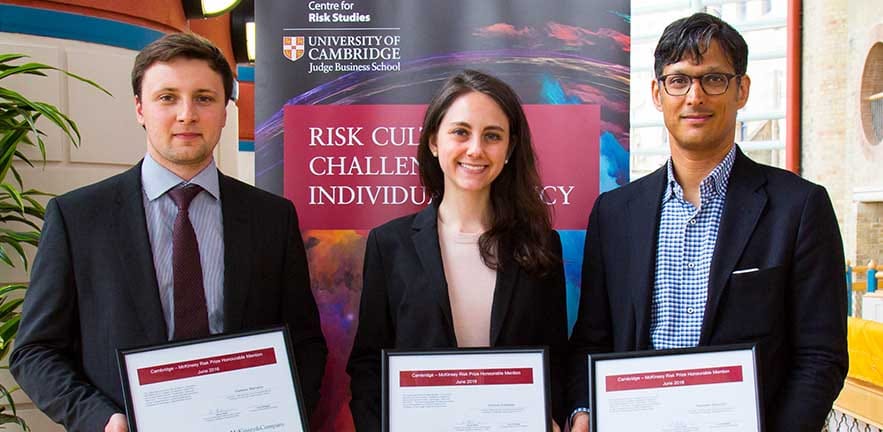
Honourable mentions
Media houses are relatively young, formed around thirty years ago, and include agencies that specialise in advertising, media, creative, PR, social, and marketing, but the function and influence of each of these sectors has changed greatly since their foundation. Media agencies now have an immense breadth of scope, moving beyond the purchasing of traditional media to include the planning of digital, social, and search campaigns, content creation, analytics and partnerships. The role of consumer insights, data analytics, and content creation has also substantially changed the industry. However, there’s a much greater change ahead that media agencies need to be prepared for. Media agencies as a business structure are at risk due to threats within the media landscape at an internal and external level. Broadly speaking there are two types of agencies: those that are part of a large media conglomerate and smaller boutique agencies, and the risks are equally applicable. Internally, media agencies are too focused on their success with digital media to realise their internal structure is failing to accommodate digital media’s demands. Externally, because the tools to support digital media are more accessible, but also due to their desire for transparency, clients are moving their media planning and buying in-house. The following details the risks and potential solutions for the industry.
This paper discusses issues and challenges of long-term risk measurement from the context of Economic Capital quantification for market risk. Economic Capital reflects counter-cyclical long-term view on risk with a very high confidence level implied by target credit rating and measured with the well-known and popular Value-at-Risk (VaR) concept. The framework is widely used by financial institutions for internal capital adequacy purposes (to reflect economic, not regulatory cost of risk), efficient capital allocation and risk adjusted performance measurement of business lines. Typically, market risk is assumed to be liquid and therefore short-term VaR methods are used to reflect current market volatility and tactically manage positions within risk limits. While it is suitable for market risk steering this approach, it is inappropriate for Economic Capital quantification. But instead of rethinking VaR modelling approach, financial institutions often adjust an existing set of short-term VaR models for Economic Capital specifics (for example, long-term horizon and high confidence level). Such adjustments could be appropriate only under strict set of assumptions that often does not hold and hence lead to misleading results. As one way to address the risk measurement issues arising mainly from popular “square root of time” VaR scaling procedure one, the historical bootstrapping technique was described and compared to most popular range of practises for market risk modelling. The long-term risk measurement is highly relevant for banks and other financial institutions (for example, insurance, asset management companies) willing or obliged to accept long-term market risk due to specifics of the underlying business model. Therefore accurate and sound modelling approaches are vital to ensure confidence in risk measurement and empower efficient application of risk models to ongoing business of financial institutions.
2015
First place
Siobhan C. Sweeney, Cambridge Judge Business School MBA Candidate
In the current economic climate marked by volatility and uncertainty, risk oversight by boards is increasingly important. The function of boards to ensure a healthy balance between risk-taking and risk avoidance is critical to the success of the company and the stability of the economy. This paper notes the significant failings of boards in this regard. The changes suggested by this paper go directly to improving this position.
The paper examines the economic, social and psychological forces propelling directors on boards towards collegial consensus and deterring real independence from each other. The paper offers a highly innovative yet simple solution. It develops the concept of a ‘Contrarian Director’, inspired by the Advocatus Diaboli (‘Devil’s Advocate’) of 1587 but modelled more closely to the Advocate General of the European Court of Justice. The paper provides a structure and process to appoint and support this director. The result of these proposed changes would be a change to culture on boards and a radical improvement in the risk oversight function by boards.
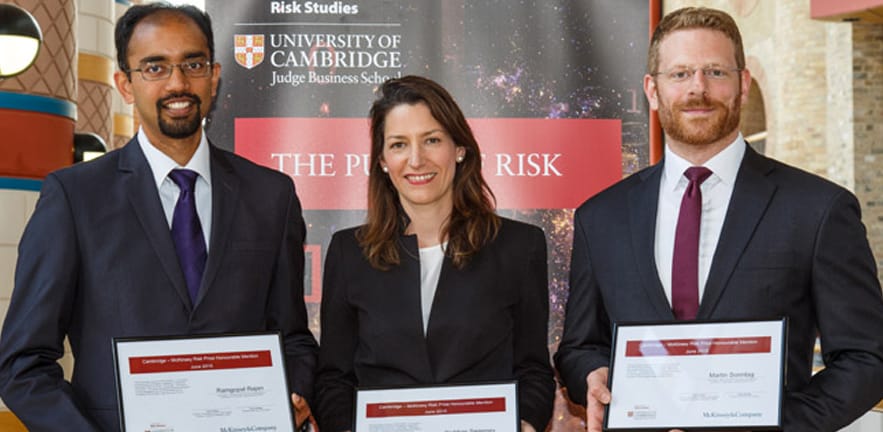
Honourable mentions
Telecommunications and mobile networks have become key to modern lifestyle. Matt J. Duffy, in his report Smartphones in the Arab Spring, talks about how the increased availability of mobile smartphones made a huge impact on the reporting of the Arab Spring revolution. Despite this growing importance the disaster recovery procedures across this industry remain fragmented and isolated compared to other critical services like power companies.
This report uses the Alberta Floods of 2013 as a case study to highlight the deficiencies in the critical response readiness of telecom companies. Power companies have mutual aid agreements and work in close collaboration with local governments to carry out extensive drills to remain ready for disaster response. For telecom companies these aspects are not well developed yet. There are no pre-determined agreements amongst telecom companies even within neighbouring geographies to respond collaboratively to disasters. Local governments in many cases do not see telecommunications as a critical service and hence do not invited these organisations for regular tests and drills.
The report looks specifically the steps TELUS took to successfully respond to the Alberta floods and come up with suggestions to help telecom industry get better prepared for disaster recovery.
With a global market volume of US$150 billion, fruit juice and fruit drinks are an integral part of our daily diet. The juice industry’s production process are decentralised and the ingredients are sourced on a global basis. In Europe, fruit juice is readily available to everyone in supermarkets and through online purchases alike.
As the demand in Europe is shifting towards healthy products, suppliers are innovating new product lines and concepts. But product variety and the scale of the market contain risks to the health of the consumers and in consequence to the business of the suppliers.
This report examines the origin, management and potential consequences of such risks from a systemic, technical and marketing perspective. It concludes with recommendations to the industry and regulatory bodies to mitigate the health risks to the consumers.
2014
First place
Campbell Hennessy, Cambridge Judge Business School, MPhil Candidate
This paper describes how approaches to fatigue management in maritime search and rescue may be applied to knowledge based business. It uses the construct of the ‘knowledge worker’ to identify the risks that fatigue poses within business and the constraints upon any proposed fatigue controls. Fatigue risks in business are associated with reduced situational awareness and a decreased capacity for employees to assess risk and make ethical decisions. Ultimately, I explore potential modifications to the United States Coast Guard’s Crew Endurance Management programme that could make it an effective control for business.
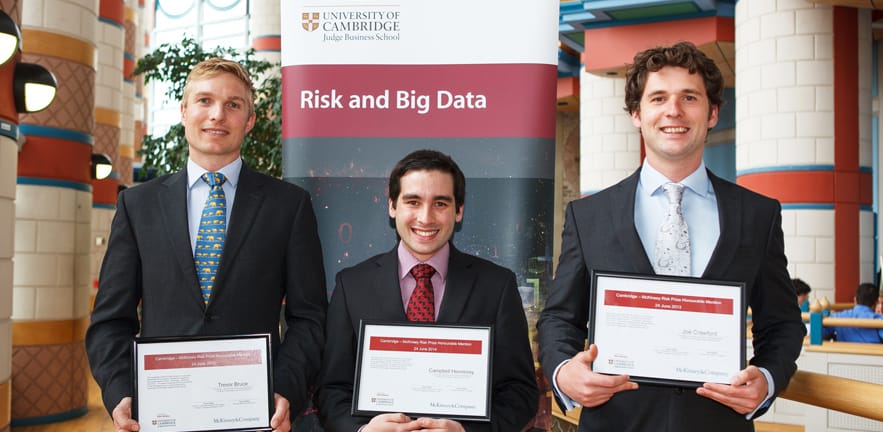
Honourable mentions
A description of how the primary risk in the mining industry has fundamentally shifted from relatively manageable “technical risks” to ESG risks, which are substantially more difficult to predict and control. ESG risks have emerged due to the combination of heightened public social/ environmental awareness and increased mining activity in more remote, and politically unstable, regions of the world. Unfortunately, the mining industry has been slow to respond to this shift and continues to encounter serious problems.
Large infrastructure projects have a reputation for being costly and risky. I wanted to examine the processes that the UK Government has in place for managing these risks and understand to what extent they are contributing to infrastructure cost overruns. As a structural engineer, I have been involved in project-level risk management on large construction projects. This project was a great opportunity to understand how this fits into the broader business-case risk management process.
2013
First place
Minko Dudev, University of Cambridge, MBA candidate
Minko was awarded the first place prize for his submission “Risk-weighted IT development for the financial industry”. He presents senior IT/operations management with a comparative overview of IT risk reduction practices at financial firms, and offers a novel risk-based approach to systematically allocate resources based on the potential direct monetary impact of system failure. Prior to his MBA Minko worked on fixed income trading technology at a US investment bank in London. He also earned a MSc in Computer Science with the Max Planck Institute for Informatics in Germany.
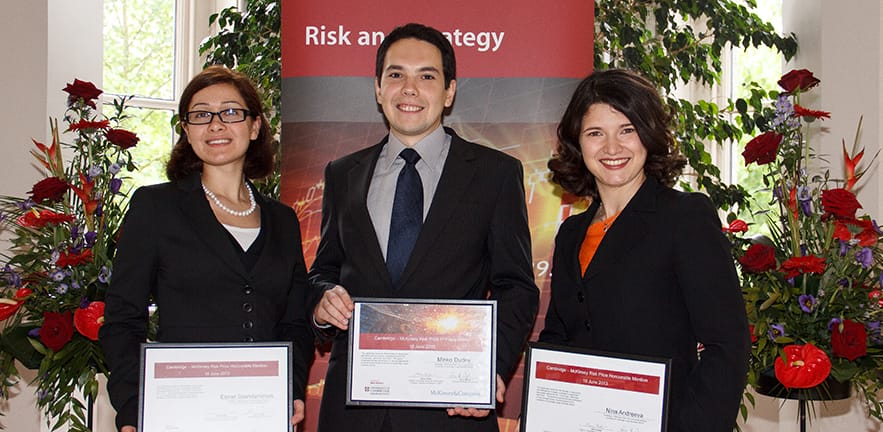
Honourable mentions
Nina describes her submission “The search for unknown unknowns: stress testing in the financial sector” as “a perfect opportunity to leverage her practitioner knowledge and present an analysis of stress testing from both a practitioner and an academic perspective”. Nina’s research interests are varied and span financial markets, risk management, rare events, behavioural finance and economics as well as social studies of finance. Before she returned to academia Nina worked at a European investment bank for the Chief Risk Officer and later managed the London Traded Products Desk specialising in traded credit risk approval.
Esmer’s submission introduces the actual study presented for the BP Global Activity Planning Team. The paper addresses offshore logistics optimisation as a means for business risk mitigation and strategic planning. The quantitative model throws light on the balance between decreasing the number of “person on board days” wasted on the platform and increasing the number (and cost) of ship visits. Prior to her MBA, Esmer held various business development and business analysis positions at Microsoft Corporation and BP. Esmer holds a BSc degree in Applied Mathematics from Moscow State University.

